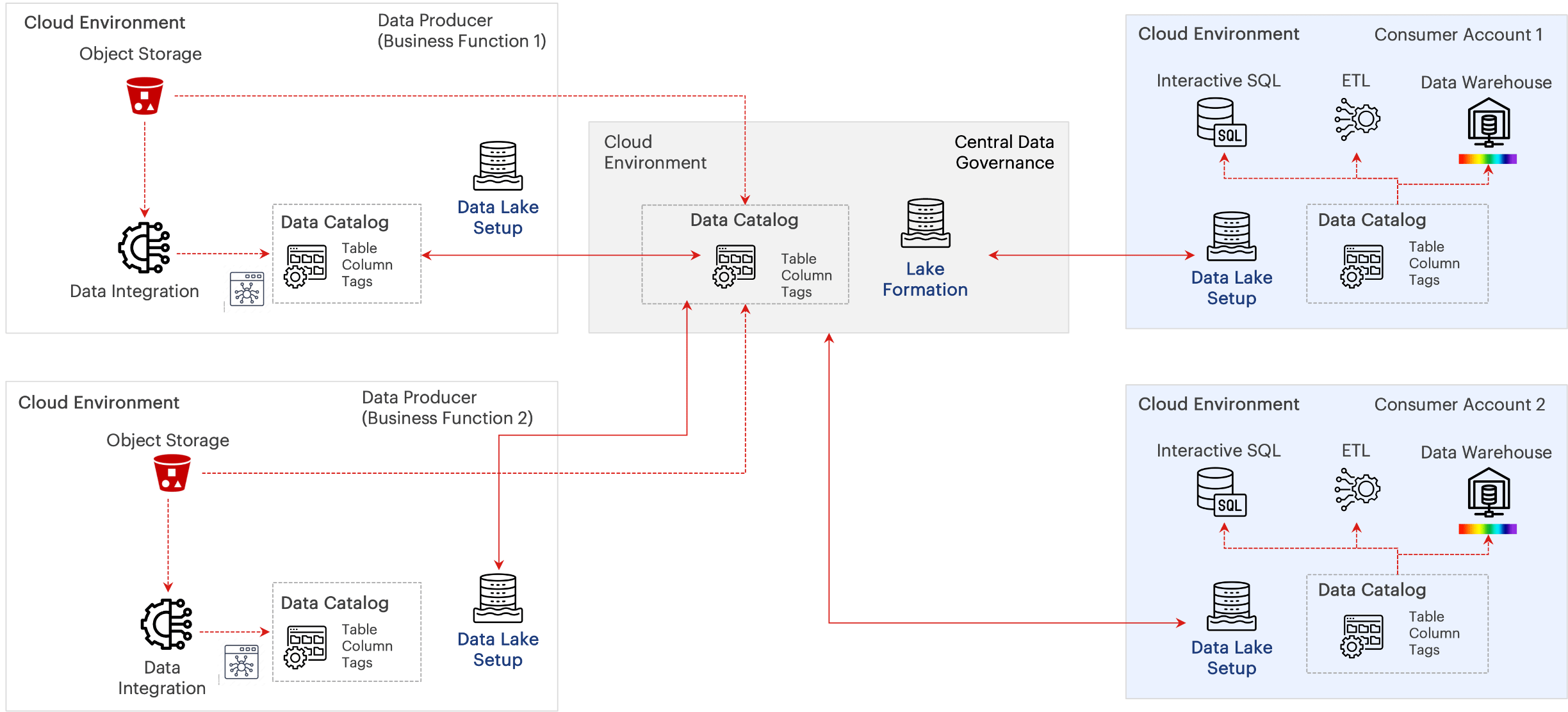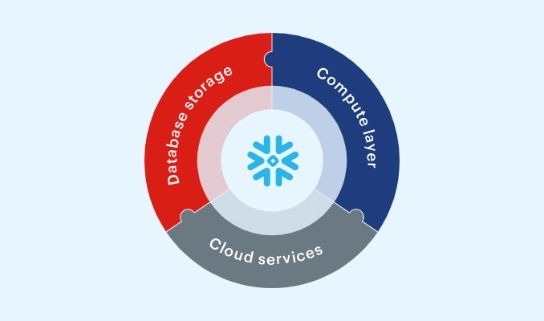Data Mesh
A decentralized framework to manage data as productsHome / What we do / Data strategy
A domain-oriented data ownership and architecture, to increase the agility and responsiveness of data teams
Centralized and monolithic data platforms are often characterized by a lack of agility, scalability, and flexibility, which can lead to data silos, slow innovation cycles, and high maintenance costs. Data mesh enables data-driven organizations to scale and innovate by applying distributed domain-driven design, product thinking, and self-serve platform design to data. Data mesh also empowers domain teams to own and share their data as products. Sigmoid can assist you in implementing data mesh by applying the principles of data engineering, data strategy and cloud data warehouse to unlock the full potential of enterprise data with robust governance and analytical use cases.
Core data mesh principles

Data as a product strategy
Apply product philosophy and design thinking to improve the quality, usability, and scalability of data.

Domain-driven data ownership
Organize analytical and operational data based on domains, allowing each team to be accountable for their own data.

Self-service data infrastructure
Enable creation of domain-agnostic functionality, tools, and systems to create, implement, and manage data products for all domains.

Unified governance
Automate the data governance system and make sure that all data products can work together effectively across domains.
What are the benefits of data mesh?

Elimination of data silos
Centralized systems often lead to data silos, where data is confined to specific teams or applications. With data mesh, data is accessible across the organization, enabling cross-domain collaboration. By ensuring that data is available to everyone who needs it.

Scalability across domains
As businesses grow, their data volumes, variety, and velocity increase. Data mesh offers a scalable solution by distributing data ownership and management across domains. This avoids the bottlenecks of centralized systems, allowing organizations to easily scale their data operations across various departments.

Cost efficiency & reduced operational overhead
Data mesh allows organizations to distribute data management responsibilities across domain teams, reducing the operational burden on centralized teams and minimizing overhead costs

Faster time to insights
Since data mesh decentralizes ownership and provides self-service tools, it enables faster access to data. Teams can get real-time or near-real-time data without waiting for centralized teams to process it, allowing for quicker decision-making and faster time-to-market.

Strong governance and security
Data mesh architectures promote stronger data mesh governance practices as they help enforce data standards for domain-agnostic data and access controls for sensitive data.
Sigmoid’s Data Mesh Framework
Convert your data into consumable information at all user levels using data mesh. Our data mesh framework helps to automate the data lifecycle, organize and analyze data, even if it resides on the cloud.

Unlocking data monetization with data mesh
Data monetization begins with democratizing access to information, transforming data into consumable products that are real-time accessible across the organization. Just like any successful product, these data products must fulfill the specific needs of data consumers. One of the most significant shifts brought about by data mesh is the realignment of responsibility for data. This approach breaks down data silos, and leads to the creation of customized assets that deliver actionable insights.
As Gartner projects, by 2026, 80% of organizations will implement multiple data hubs as part of their data fabric strategy to enhance data sharing and governance. As organizations embrace a culture of data-driven decision-making, they can uncover new revenue streams, optimize operational efficiencies, and improve customer experiences.

Customer success stories


Omnichannel marketing data hub for campaign optimization
Sigmoid built a centralized data platform on Azure with automated data pipelines to optimize various omnichannel marketing campaigns’ ROI for a leading medical technology company.
- 5% increase in funnel conversion
- 500 data pipelines automated
- Faster integration of new datasets


Data hub on AWS enables near real time tracking of 20+ KPIs to improve sales performance and customer satisfaction
Sigmoid created a data hub on AWS for field sales, regional sales and marketing leaders with enhanced visibility into supply and demand of products across stores for over 100 field sales, account owners and regional heads.
- 90% improvement in query performance
- 80% coverage of retailers in the USA
- 5x cost reductions from decommissioning on-prem data centers


Centralized data lake and automated data pipelines drive real-time KPI monitoring through a Supply Chain Control Tower
Sigmoid optimized logistics management by re-architecting the data platform and building robust and scalable data pipelines for industrial gas and equipment suppliers.
- 1 month to real-time KPI visualization
- Enhanced tracking and reporting capabilities
- Reduced costs by streamlining freight reconciliation process
How to successfully implement a data mesh to monetize data products
Implementing a Data Mesh in your organization requires a shift from traditional centralized data architectures to a more decentralized data management and domain-driven approach. Data mesh implementation requires you to change the underlying infrastructure itself. The goal is to treat data as a product and empower different business units to manage their own data while ensuring collaboration and governance across the organization.
Identify the critical domains
Pay immediate attention to critical domains that generate the highest revenue or have the most significant impact on the business.
Build specialized data hubs
Start with creating a domain-specific data hub to collect, process and analyze data from various sources and then scale it across all domains.
Assign domain ownership
Allocate a dedicated domain owner to each data hub who will own the decisions regarding data quality, access, and usage.
Expand to other domains
Scale your data hub across other domains while updating data contracts for the new domains to maintain consistency across the mesh.
Improve and scale continuously
Review and refine the architecture of the data hubs periodically to ensure it meets the evolving needs of the organization.







